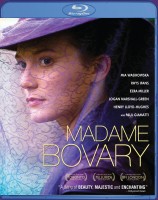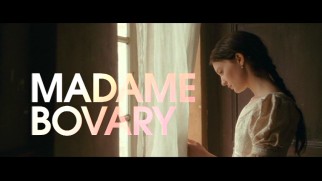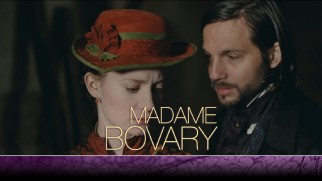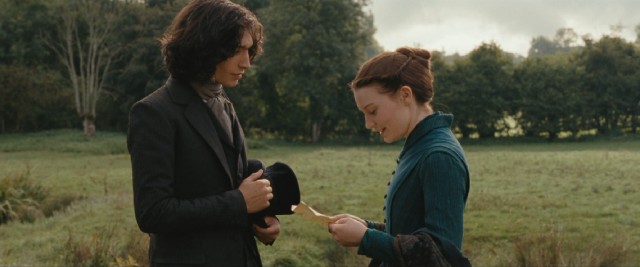Madame Bovary Blu-ray Review
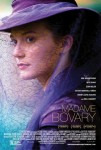 |
Madame Bovary
Theatrical Release: June 12, 2015 / Running Time: 119 Minutes / Rating: R Director: Sophie Barthes / Writers: Felipe Marino, Sophie Barthes (screenplay), Gustave Flaubert (novel) Cast: Mia Wasikowska (Emma Bovary), Rhys Ifans (Monsieur Lheureux), Ezra Miller (L้on Dupuis), Logan Marshall-Green (Marquis d'Andervilliers), Henry Lloyd-Hughes (Charles Bovary), Laura Carmichael (Henriette), Olivier Gourmet (Monsieur Rouault), Paul Giamatti (Monsieur Homais), Luke Tittensor (Hippolyte), Richard Cordery (Abb้ Bournisien), Wendy Nottingham (Madame Homais), Simon Muller (Monsieur Dubocage), Simon Paisley Day (Bailiff), Morfydd Clark (Camille) |
Buy Madame Bovary from Amazon.com: Blu-ray DVD Instant Video
Since her discovery by Hollywood some seven years ago, Australian actress Mia Wasikowska has displayed a clear taste for period drama: The film opens with Emma Bovary dying alone outside on a trail in the autumn. We then journey back to her finishing lessons and her Catholic wedding to mustachioed country doctor Charles (Henry Lloyd-Hughes). In these times, getting married is what a young woman does. But Emma soon wishes to do more. Her days of solitude and boredom, awaiting her husband's return for dinner, weigh down on her. She dreams of visiting Paris or anywhere really other than Yonville, which is more like Yawnville for her. Her attempt to prepare an ornate dessert goes unappreciated.
With nothing else to do, Emma has her eye caught by Leon Dupuis (Ezra Miller), a traveled young law clerk. There's also the Marquis d'Andervilliers (Logan Marshall-Green), a gentleman who extends a horse hunt invitation to her she gladly seizes. While preventing these two near-affairs from advancing, Emma begins turning more and more to Monsieur Lheureux (Rhys Ifans), a door-to-door salesman with generous credit policies and a persuasive pitch.
As it becomes clear that Charles, who attempts a news-making surgery on the clubbed foot of a servant at the behest of his employer (Paul Giamatti), has no ambitions to live anywhere else or do anything more, Emma moves forth with those extramarital relations, first with the Marquis and later with Leon. As her deeds attract reputation-soiling rumblings, Emma also finds herself in deep debt with Lheureux, whose demeanor changes accordingly. Having racked up a bill of 10,000 francs, a sum far beyond their means, the Bovarys are subjected to demeaning house searches and repossessions, which brings us around back to the beginning of the film.
The prevailing state of the story and its protagonist is restlessness, a condition that doesn't make for the most compelling film visually or otherwise. This Madame Bovary is directed by Sophie Barthes, the writer-director of 2009's offbeat Cold Souls starring Paul Giamatti as a version of himself who has his soul removed from his body. Barthes' first film since is an improvement over that much less clever than it thought it was comic fantasy. The director adapts Flaubert's novel with Felipe Marino, who makes his screenwriting debut after nearly a decade of producing. The script is selective in what it draws from the text, eliminating the book's early focus on Charles, his meeting of Emma, and the birth and existence of the Bovarys' child. Motherhood does not arise here, allowing Emma to be disappointed by the altogether emptiness of her existence.
It is easy to lose interest in this film and its characters' futile search for happiness. It's also easy to never harbor any interest for either in the first place. Bovary may be a familiar title (I remember first encountering it in one of the earliest episodes of "Home Improvement" as a selection for Jill's soon-disbanded book club), but it isn't necessarily one moviegoers need to see filmed with regularity, even if the book's ideas seem more impervious to time than many. Flaubert's story has been put on film countless times, including five different features in the 1930s and '40s. In more recent decades, it has more frequently been tapped for television as a movie or miniseries, though the French made a theatrical film back in 1991.
This newest English language version, which premiered at 2014's Telluride Film Festival, failed to generate much interest anywhere, grossing just $44 thousand in 15 domestic theaters in June before hitting Blu-ray and DVD this week.
VIDEO and AUDIO Some of the allure of costume dramas lies in the aesthetics and Madame Bovary is no slouch when it comes to sets and costumes. The Blu-ray's stately 2.40:1 transfer shows off the vibrant visuals with nary a concern. The Dolby TrueHD 5.1 soundtrack is also commendable, if prone to extended periods of quietude.
BONUS FEATURES, MENUS, PACKAGING and DESIGN No inserts accompany the full-color disc inside the unslipcovered blue keepcase. The menu loops an unremarkable montage of clips and piano score.
CLOSING THOUGHTS The ideas of Madame Bovary have not lost their intrigue, but the novel remains difficult to convey on film. This latest adaptation looks nice and resonates a little, but never quite stirs or excites as it wants to. A rental strictly for costume drama junkies, Alchemy's barebones Blu-ray is soon destined for bargain bins. Buy Madame Bovary from Amazon.com: Blu-ray / DVD / Instant Video
|
Related Reviews:
DVDizzy.com | DVD and Blu-ray Reviews | New and Upcoming DVD & Blu-ray Schedule | Upcoming Cover Art | Search This Site
DVDizzy.com Top Stories:
Mia Wasikowska: Albert Nobbs Alice in Wonderland The Kids Are All Right Only Lovers Left Alive Lawless That Evening Sun
Ezra Miller: City Island | Paul Giamatti: The Last Station Saving Mr. Banks Win Win
Rhys Ifans: Elizabeth: The Golden Age Passion Play Greenberg
Ch้ri Stonehearst Asylum Brideshead Revisited Mr. Turner Enchanted April
New: The Water Diviner Adult Beginners Every Secret Thing
Text copyright 2015 DVDizzy.com. Images copyright 2015 Alchemy, Occupant Entertainment, Prescience VP Finance, and Altus Media.
Unauthorized reproduction prohibited.


